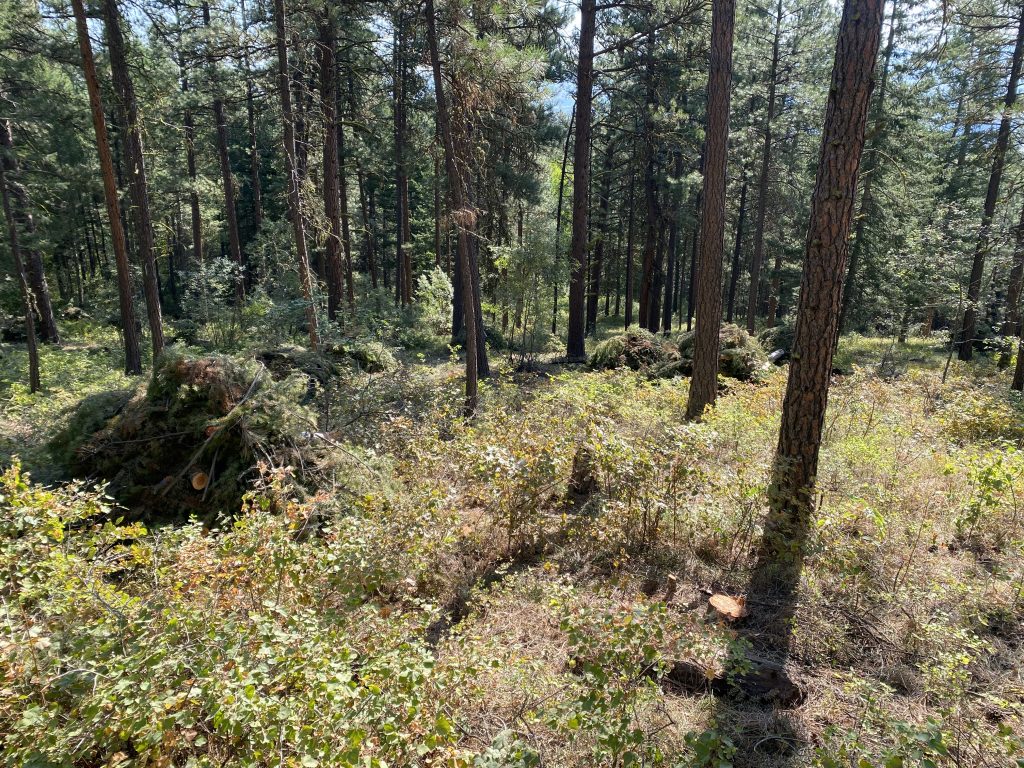NWTF and USDA Forest Service Collaborate to Tackle Wildfire Crisis in Montana
The National Wild Turkey Federation has teamed up with the USDA Forest Service in Montana's Bitterroot National Forest to conduct forest restoration amid what has been deemed a wildfire crisis. The restoration is part of the NWTF's Big Sky Forestry Initiative and the Forest Service's Wildfire Crisis Strategy.
The ongoing project, known as the Stevensville West Central Fuels Reduction project, encompasses approximately eight miles of Forest Service boundary in Montana's Bitterroot Valley, stretching between the Sharrot and Silverthorn Watershed in the north and the Sweathouse Watershed in the south.

Photo courtesy of David Nikonow.
Photo courtesy of David Nikonow.
The wildfire crisis has emerged as a significant concern in the western regions, primarily attributed to factors such as deteriorating forest health caused by overgrown forests, a warming climate and unprecedented drought conditions. In this project area, the absence of beneficial low-intensity fires over an extended period has led to the rapid increase of Douglas fir and other conifers, which has in turn, outcompeted and crowded out the ponderosa pine. This situation has escalated the risk of wildfires in the region and resulted in a decline in wildlife habitat diversity, underscoring the critical importance of the ongoing restoration project.
Through the West Central project, partners and contractors will reduce the risk of stand replacement wildfires through various strategic approaches. These include reducing the number of trees in the area, improving conditions for select tree species, minimizing fuels that allow fire to easily spread and elevating canopy base height by removing low-hanging branches. By undertaking these treatments, the project will set the forest on a positive path toward restoring its structure, composition and overall health.
The final goal of this project will re-establish a fire-adapted, resilient, diverse and sustainable forest ecosystem, ensuring better protection against future wildfire events. Additionally, these improvements will foster the growth of abundant forage for wildlife, creating high-quality wildlife habitat that promotes ecological balance and long-term sustainability in the region.
“It's exciting to see how fast this work is helping to open up the forest understory,” said David Nikonow, NWTF cooperative biologist in Western Montana. “After our thinning treatments are completed, the Forest Service will apply controlled burns to the area.”
The NWTF has secured funding to support the execution of the project and will administer financial assistance through the Big Sky Forestry Initiative. This initiative addresses several goals, such as reducing the risk of catastrophic wildfire, enhancing wildlife habitat, ensuring clean water sources, preserving access to recreational opportunities and reducing wildfire risk for communities in wildland areas.
“As a longstanding conservation partner with the Forest Service and the longest-serving stewardship contractor working on our National Forests, the NWTF is excited to be able to assist the Bitterroot National Forest in this crucial endeavor,” Collin Smith, NWTF district biologist and project manager said. “Montana’s wildlife enthusiasts will also be pleased to know that the work being performed on these forest stands not only results in reduced wildfire threat and intensity, but also enhances habitats for a diverse array of popular game and non-game wildlife species.”
If you would like to contribute to the Big Sky Forestry Initiative or get involved with a local NWTF chapter, contact Jason Tarwater at (785) 221-6515 or jtarwater@nwtf.net.
About the National Wild Turkey Federation
Since 1973, the National Wild Turkey Federation has invested over half a billion dollars into wildlife conservation and has conserved or enhanced over 22 million acres of critical wildlife habitat. The organization continues to drive wildlife conservation, forest resiliency and robust recreational opportunities throughout the U.S. by working across boundaries on a landscape scale.
2023 is the NWTF's 50th Anniversary and an opportunity to propel the organization's mission into the future while honoring its rich history. For its 50th Anniversary, the NWTF has set six ambitious goals: positively impact 1 million acres of wildlife habitat; raise $500,000 for wild turkey research; increase membership to 250,000 members; dedicate $1 million to education and outreach programs; raise $5 million to invest in technology and NWTF's people; and raise $5 million to build toward a $50 million endowment for the future. Learn how you can help us reach these lofty goals.
